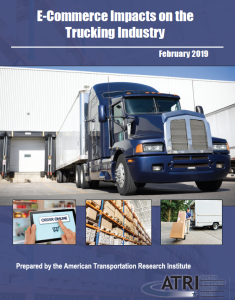The American Transportation Research Institute (ATRI) released an analysis of the impacts of e-commerce trends on the trucking industry, including the challenges and opportunities that more regionalized retail supply chains and the proliferation of urban last mil deliveries have presented.
The analysis provides background on e-commerce and omnichannel retailing trends and maps the implications of these trends to trucking operations. Key findings include:
- From 1999-2017, e-commerce sales increased from less than one percent of total US retail sales to more than nine percent, reflecting a 3,000 percent increase in e-commerce sales.
- Annual growth of e-commerce has ranged between 13 and 16 percent over the last five years, outpacing the one to five percent annual growth in traditional retail sales.
- Retailers are becoming more flexible in how they transact with consumers by decentralizing their distribution and fulfillment networks to bring inventory closer to consumers.
- There were 2,130 fewer department stores and 385,000 fewer jobs at these stores in 2017 compared to 2015; there were 1,937 more courier services operating and just over 85,000 new employees hired in the sector during this time period.
- Last Mile Fulfillment Centers represented 73 percent of the industrial real estate market in 2017, a 15 percentage point increase from the previous year.
- Registrations for single-unit trucks increased by 7.8 percent between 2007 and 2016 compared to 4.4 percent growth in combination truck registrations.
- The number of intra-regional and last-mile truck trips has increased while the average length of haul has declined. Average trip lengths have decreased 37 percent since 2000, while urban vehicle miles traveled have increased for much of this time period.
- Intrastate and local hauls for e-commerce could serve as a training opportunity for 18-20-year-old drivers, representing a huge new pool of potential interstate truck drivers.
Conclusions
E-commerce and the push toward omnichannel retailing are altering retail business models and distribution/fulfillment networks. The trucking industry is in a unique position to adapt to and prosper from these consumer-driven trends, as the more fragmented retail ecosystem has forced retailers to become more reliant on their logistics partners.
Trucking industry stakeholders are still adjusting to the implications of decentralized retail distribution/fulfillment networks and the growing demand for shipment and package deliveries in densely populated regions. As the composition of truck trips become more regionalized, motor carriers are experimenting with different types of equipment and technologies. Even more, carriers are tightening up their operations to accommodate the shorter delivery windows and faster turnaround times required by emerging retail business models.
This research has also shed light on the opportunities and challenges that these changes present for the most critical issues facing the trucking industry. For instance, the growing volume of intra-regional and local operations may help alleviate some of the quality of life concerns underlying issues with Driver Retention as well as Driver Health and Wellness. At the same time, this added demand for truck trips has further emphasized the need for long-term solutions to the Driver Shortage.
“ATRI’s research provides a critical roadmap for trucking industry stakeholders to address the challenges and benefits of e-commerce and omnichannel retailing,” said Tom Benusa, CIO of Transport America. “These trends are game-changing, and our industry must adapt quickly to ensure that trucking continues to be the preeminent freight mode.”

